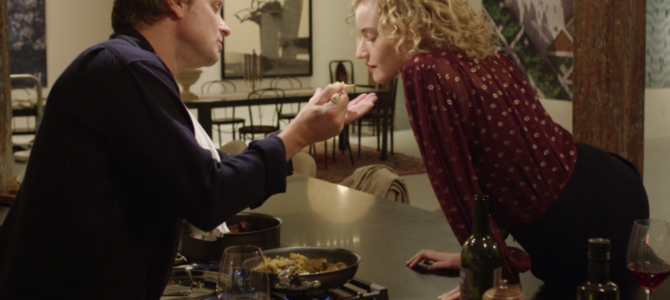
Senior year of college, a close friend was over the moon about her new beau and wanted to set me up too, as the newly coupled are wont to do. She identified the perfect candidate, a recent college graduate who soon left a voice message inviting me to watch a movie at his place.
This proposed plan made me uncomfortable, but I couldn’t quite articulate why. That is, not until my friend’s boyfriend disapprovingly said the scenario was far too familiar for a first date, and I should insist on a more public meeting place, which I immediately did.
I thought about this long-forgotten chapter of my life while watching an episode of Amazon’s “Modern Love” entitled, “So He Looked Like Dad. It Was Just Dinner, Right?” The highly awkward episode, based on a 2006 essay of the same name, matches 21-year-old Maddy with Peter, a 50-something man she dubs a “robotics genius.”
While Maddy is looking to emotionally replace her father, who passed away 10 years earlier, the object of her affection and baking attention views Maddy with anything but paternal eyes. Peter cooks duck at his incredible apartment in what everyone but Maddy understands is a very forward first date.
From that point on, the two exist in close physical proximity but intellectually parallel storylines. She thinks she’s enjoying quality time with a stand-in daddy who cuddles her and plunges her toilet, while he believes he’s wooing a young hottie who’s into him.
Indeed, in 31 short minutes, this episode manages to encapsulate not only deep truths about the lasting pain of father absence, but also highlight the roots (of some) of society’s Me Too problems, including men and women speaking past one another, especially at these very different life stages.
Knowing what we do about Maddy, the mother in me wanted to tell her to skip dinner from the get-go. Later on, I wanted to reach through my computer when Maddy, who promises herself she’ll leave after dessert, follows Peter’s voice to his bedroom, where there is, of course, no dessert.
He’s lounging comfortably on his bed and invites her to join him in listening to some of the classical music he loves. After briefly hesitating, Maddy joins him and they snuggle, and her voiceover contentedly shares, “He smelled like wine and oranges and dependability. He had a gray comforter. He was a gray comforter. I was in heaven.”
If Peter could hear this internal monologue — or were perhaps better at reading women — he might have considered why this newly legal drinker, who’s younger than his own adult daughter, is drawn to him. Another man also might have shifted gears when Maddy’s response to, “How can I make you more comfortable?” is a request for a story about her childhood. But Peter stays the course, even when she wants to play a game, casting him as Dad.
After that date, they fall out of touch for a few weeks. But when Maddy’s in a minor car accident, it’s Peter she calls. He accompanies her to the hospital and helps reassure her while she has an MRI. Then they begin spending weekends together, as couples do. It all becomes momentarily complicated when Peter tries to avoid his daughter and grandson at the zoo, especially since his daughter, unlike Maddy, senses what’s up.
Maddy and Peter’s dueling versions of reality collide when he buys her an expensive coat; he loves that she looks like Little Red Riding Hood and tries to kiss her. Only then do they finally communicate. He says she’s been coming onto him for weeks. Maddy frustratedly responds that she’s been saying “with signs and words that wouldn’t hurt your feelings that I’m not into you that way.” It seems she took their snuggling to be “the dad kind,” while he found it sexually suggestive.
Peter and Maddy Today Would Be a Me Too Nightmare
It’s clearly news to Peter that Maddy lacks dating experience, so the signals he believes he’s seen were not calculated. Maddy says she doesn’t “know what it feels like to have a man look after you just ‘cause.” In other words, she doesn’t want a boyfriend; she wants someone to fill the father-shaped hole in her life.
What’s notable watching this as an outsider is that both sides are fairly clear about what they want. Yet those signals are repeatedly missed by the other person in the episode.
If this story were being lived and written today — as it may be somewhere — Maddy would likely wonder more explicitly about the power imbalance. Peter would worry less about feeling “like a fool” and more about Me Too.
Peter isn’t a bad person. He’s just somewhat clueless and possibly blinded by the ego boost of Maddy’s youthful attention, which he interpreted as if she were a peer. In 2019, that’s a potentially career-ending combination.
Meanwhile, Maddy demonstrates the importance of having a relationship with one’s father, or if that’s not possible, with some other nurturing male figure. As writer Mary Eberstadt recently observed, a rising number of young women are growing up without fathers or brothers (because families are shrinking and marriage less stable). Those women are more likely to grow up without a sense of healthy, normal male behavior or knowing what should be out of bounds, like late-night hotel room visits to a boss. In Maddy’s case, there’s no Me Too trauma, but she could surely have saved herself some trouble if she’d only said no to duck.









